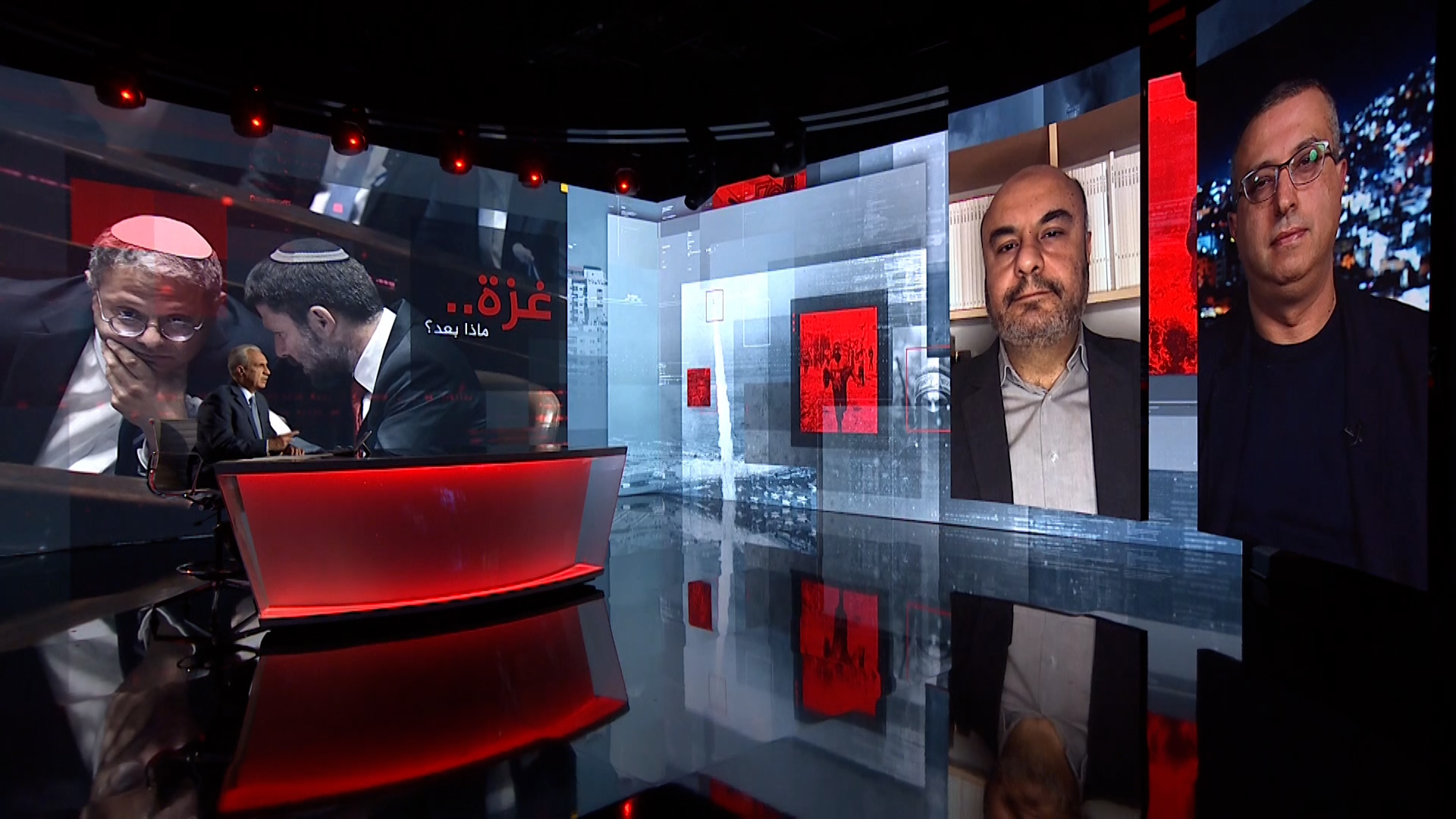play videoplay video
Video duration: 27 minutes 46 seconds 27:46
Analysts believe that all Israeli politicians reject the idea of the establishment of an independent Palestinian state, pointing out that the departure of Prime Minister Benjamin Netanyahu from power does not mean that there will be radical changes in this position without an actual international position that goes beyond the stage of criticism to the application of practical sanctions.
From the point of view of the expert on Israeli affairs, Muhannad Mustafa, there are common interests among the Israeli political spectrum, foremost of which is the refusal to talk about a Palestinian state, even if the reasons differ.
According to what Mustafa said during his participation in the program “Gaza... What Next?”, the extreme right wants complete control over the Palestinian territories in the West Bank and Gaza, while others - including War Council member Benny Gantz - want a Palestinian entity less than a state with full control over The West Bank is a position that stems from security interests, according to him.
Mustafa believes that talking about radical changes in the solution of Gantz coming to power instead of Netanyahu is not realistic, pointing out that he (Gantz) was defense minister in the government of Yair Lapid, which was called the government of change, and yet it did nothing except increase raids in the West Bank.
Right-wing society
Mustafa stressed that Israeli society "has become right-wing for two decades, and lives with the idea that it is in a constant state of existential danger, and therefore does not seek any settlement, and does not accept to deal with the Palestinian as a human being, because the Palestinian state, whatever its form, threatens the existence of Israel."
The same opinion was held by political analyst Hossam Shaker, who said that the Israelis reject the Palestinian state, whatever its form, but for different reasons, adding that “the government of Israel cannot be a partner in any political settlement,” and that this situation “is the outcome of the Oslo Accords.”
Therefore, in Shaker’s opinion, Israeli society is not ready for any talk about an independent state for the Palestinians, an opinion that Mustafa agrees with by saying that there is a consensus to reject the idea of a Palestinian state, but at the same time he points out that there is an internal disagreement regarding the nature of this state - if it exists - and the size of it. Settlement in the West Bank and how to deal with the Palestinian Authority.
Mustafa pointed out that Gantz is currently popular, because he comes from the military establishment and has a security tendency that the Israelis are looking for, but at the same time he knows that he needs the less extreme right that opposes Netanyahu because of what he considers a judicial coup.
According to Mustafa, this less extreme right controls some of the 40 seats in the Knesset, which Gantz is trying to preserve by all means, “which means that no radical change will occur that contradicts this trend once he comes to power, in addition to the fact that the entire situation will not allow him to make any change.”
Also, Gantz - and here we are speaking to Shaker - “had previously dealt with the same Israeli arrogance during his time in government, and therefore the facts on the ground will impose the changes, not the Israeli Prime Minister.”
In Mustafa’s opinion, the only thing Gantz can offer is some powers to the Palestinian Authority to please America, whose importance he realizes for Israel’s security.
On the other hand - Mustafa says - the right believes that the current government can maintain its popularity internally if it confronts international pressures. Therefore, these pressures increase the unity of Netanyahu’s government, and do not harm it.
A defining moment
Mustafa stressed that the Israeli right "is living a defining historical moment, because it realizes that the fall of Netanyahu means the rise of Benny Gantz, who will strengthen the position of power, and therefore it (the right) is trying to preserve the government," adding, "Netanyahu has high confidence, because he fully realizes that the right will not give up." "About him, especially Minister of National Security Itamar Ben Gvir, who is exploiting international pressure to give legitimacy to the right."
Regarding the extent of Israel’s ability to confront international and economic pressures, Shaker said, “Israel is aware of the existence of current risks, but it guarantees political, military, and economic support from America and some Europeans,” stressing that this matter “encourages the unruly faction that believes it is capable of doing anything and launching any attack.” "Wars."
He added, "In practice, American and Western support for Netanyahu is still unrestrained, and there is not even criticism of the army's behavior, and therefore the government acts like a spoiled child who dictates more dictates, and receives a response despite some reprimands."
From this standpoint, the real dilemma currently - as Mustafa says - is the one that the international community is experiencing, because it has not imposed any punishment on Israel, which prompts it to continue what it is doing.
Mustafa concluded that the only thing that might deter Tel Aviv is to impose economic, political, military and financial sanctions on it, because if it had paid a price for its war, it would have stopped it immediately, according to him.
Source: Al Jazeera

